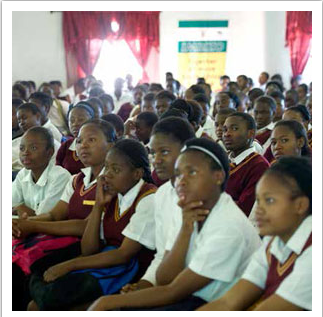Basic education gets it right
Basic education gets it right sadminProgress in achieving the Millennium Development Goals, feeding close to 10 million schoolchildren and replacing inappropriate infrastructure are some of the highlights of the Department of Basic Education in the first quarter of the fifth administration.
Speaking at the Social Protection, Community and Human Development Cluster media briefing, Minister of Basic Education Angie Motshekga said the achievements were a result of partnerships between government, various sectors and citizens.
“The achievements we have recorded have been the result of various sectors and citizens working with government, playing their part for a better South Africa. We look forward to working with our social partners in the country and beyond to move South Africa forward,” she said.
Achieving the Millennium Development Goals (MDGs)
Minister Motshekga said the country was on track to achieve the Millennium Development Goals (MDGs) related to literacy and Early Childhood Development (ECD).
“This includes achieving universal primary education with a focus on both access and completion of primary education as well as gender.”
MDGs are eight targets that all the member states of the United Nations have agreed to achieve by the year 2015. Among some of the goals is halving the number of undernourished people, reducing illiteracy by 50 per cent, achieving universal primary education, and promoting gender equality.
The Minister also highlighted that over 150 million textbooks have been distributed across the country.
“We are also pleased to report that extensive programmes were implemented to improve access to learning and teaching support materials with over 150 million textbooks and workbooks now in the hands of learners.”
National School Nutrition Programme
The National School Nutrition Programme, which aims to decrease inequalities in access to education, caters for 9,2 million school children.
“Interventions to mitigate inequities in access to education include the National School Nutrition Programme that now caters for around 9,2 million school-going children.
“In addition, scholar transport and no fee schooling has provided to 78 per cent of learners (over eight million learners) in about 81 per cent of public schools (over 20 000 schools) which do not charge fees.”
Improving school infrastructure
The department has also made progress in replacing inappropriate structures that did not have sanitation and any form of electricity.
“About 12 school structures were completed to replace inappropriate structures, 33 schools provided with sanitation and 22 schools provided with electrification.”
School Governing Body elections
Three months from now, schools across the country will hold elections for School Governing Bodies (SGB).
“Preparations for these elections are already at an advanced stage. For the first time, the provinces are ahead with preparations. This demonstrates the maturing of the sector in applying business processes,” the Minister said.
She called on parents to support the election and participate in choosing the governing bodies to help run the schools effectively.
“Government encourages all parents to support the SGB elections by standing as candidates or by participating as voters because without parental and community support, education can never be a societal issue as envisaged by government.”
Other achievements by the department include the launch of a Thutong Portal which is accessible on: www.thutong.doe.gov.za for Home Based Education, a book flood campaign, teacher resource centres and pilot project on Incremental Introduction of African Languages.
